Incogni review 2025: is it worth it for online privacy protection?
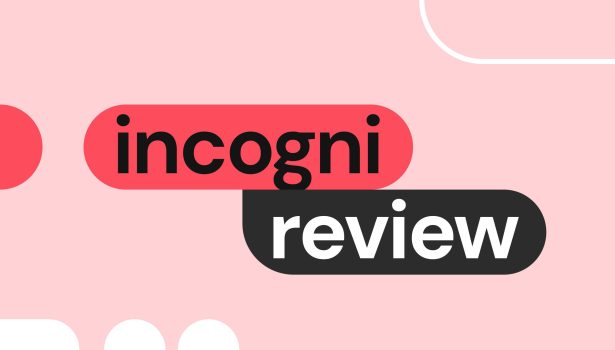
Incogni promises to protect your online privacy by removing your personal information from data brokers, but is an Incogni subscription worth it? Read our Incogni review to discover how it works, what it costs, and what you can expect from this data removal service.
Feature summary table
| Feature | Details |
|---|---|
| Sites covered | 200+ |
| People-search sites covered | Limited |
| Verification of removal | Relies on data broker self-reporting |
| Pricing | $7.49/month (annual plan) |
| Customer support | Knowledge base, contact form |
| Data sharing | Shares your info with data brokers |
| Family plan | Yes, up to 5 people |
Incogni review: pros and cons
| Incogni pros | Incogni cons |
|---|---|
| 1. Removes your information from around 200 sites 2. Resends removal requests on your behalf until data brokers respond 3. Covers marketing, recruitment, and risk mitigation data brokers plus some people-search sites 4. Adds your name to suppression lists 5. Allows you to add multiple last names 6. Emails weekly progress reports 7. Intuitive, easy-to-use dashboard 8. Affordable pricing 9. Flexible billing (annual and monthly plans) 10. 30-day money-back guarantee 11. Operates globally | 1. Predicts which sites have your information instead of scanning them to find your exact profiles (though it does randomly check some people-search sites) 2. Relies on sites to self-report removal instead of verifying it themselves 3. Does not cover many of the most popular (and most problematic) people-search sites 4. Does not list the information it found on you 5. Does not provide links to pages with your information on data broker sites 6. Does not prove removal 7. Cannot input multiple aliases, addresses, phone numbers, or email addresses 8. Shares user contact information with data brokers (potentially exposing info to those who don’t already have it) 9. Limited support (knowledge base and contact form) 10. No business plans 11. Includes data brokers that aren’t relevant to U.S. residents |
How does Incogni work?
Owned by Surfshark, which also offers a VPN and password manager, Incogni is a data removal service that deletes your personal information from data brokers. Incogni contacts data brokers and sends removal requests on your behalf, then allows you to track progress on your personal dashboard.
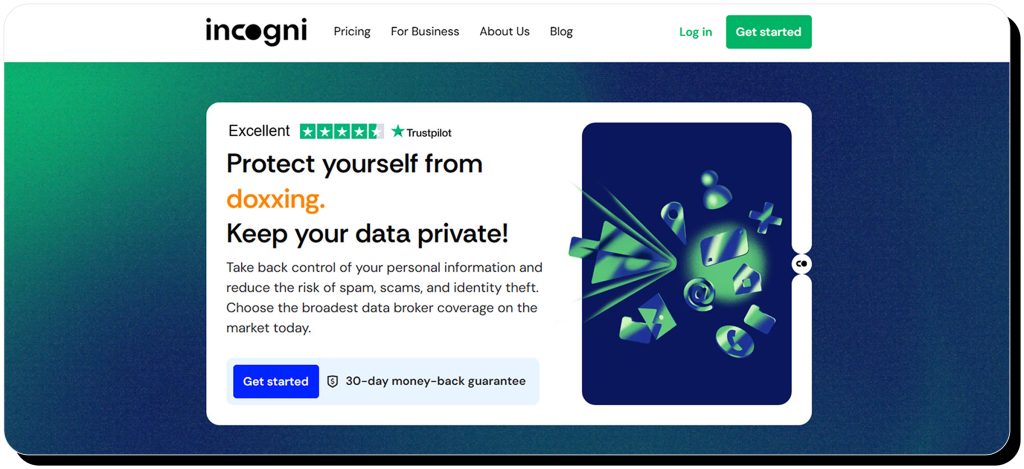
Removing yourself from data brokers is critical to protecting your online privacy and safeguarding your digital footprint. That’s because these sites collect, organize, and sell your personal data online to anyone willing to pay for it, from marketers and old classmates to criminals who can use your information to impersonate and scam you. Removing yourself from data brokers, then, is a form of identity theft protection and scam prevention.
Most people don’t have hundreds of hours to send removal requests to the hundreds of data broker sites on the web, so Incogni automates the data removal process. In fact, Incogni states its service can save the average person 304 hours in manual removals.
Here’s how it works.
1. Visit Incogni’s website and sign up
Choose between a monthly and an annual Incogni subscription. We chose the yearly option and were prompted to verify our email address.
2. Enter your personal information
Incogni asks for your first, middle, and last name (surname). We noticed that you can enter multiple surnames, which is important if you changed your name when you got married since some sites might only have your maiden name.
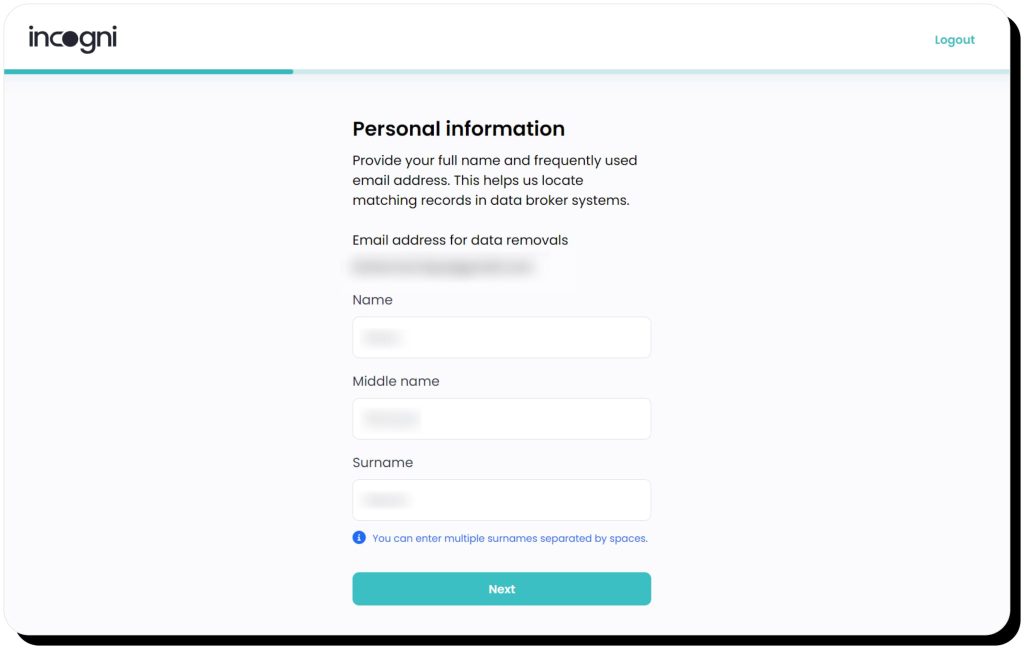
3. Enter your address information
Enter your home address, city, state, zip code, and country.
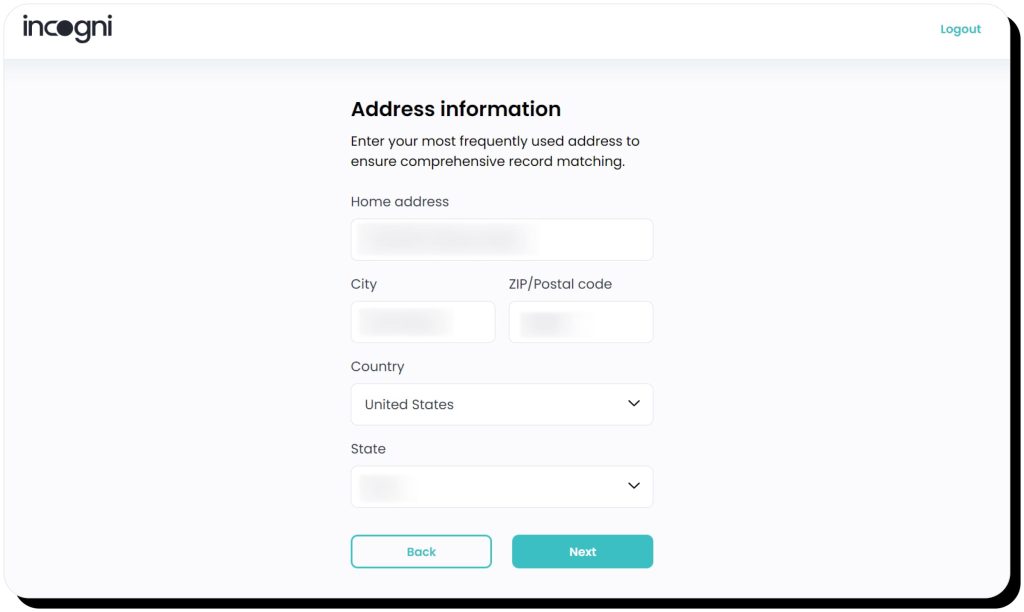
4. Sign the authorization form
Incogni requires you to electronically sign an authorization form that grants their data removal tool the right to erase personal information, withdraw consent to process your personal data, and object to personal data processing on your behalf.
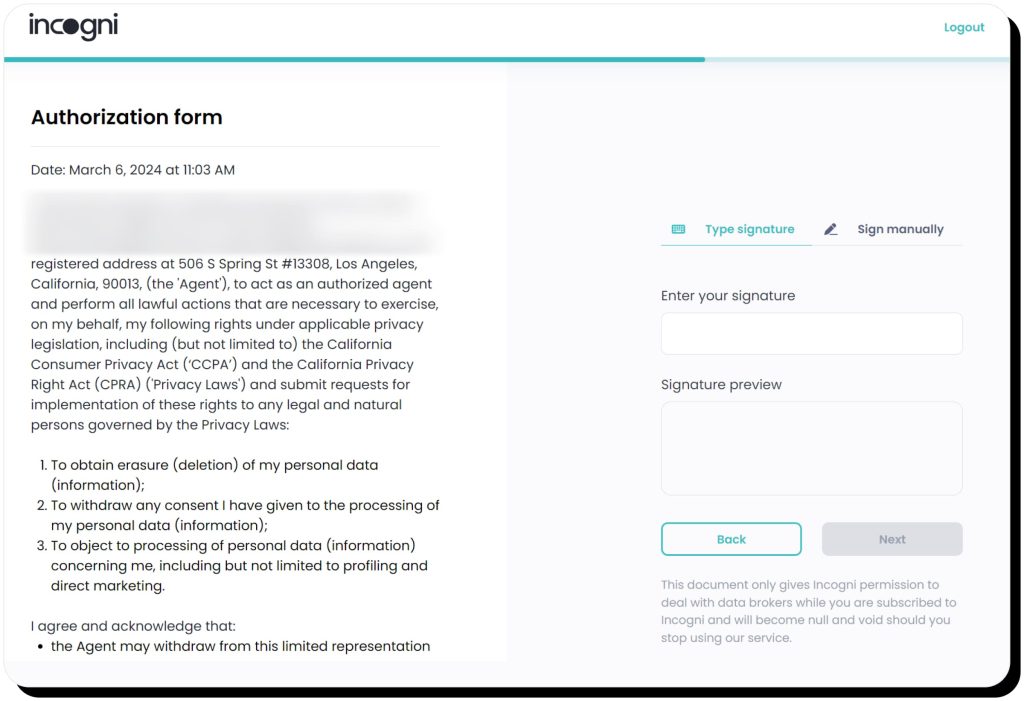
5. Confirm your information
Next, you’ll review and confirm the personal information you submitted.
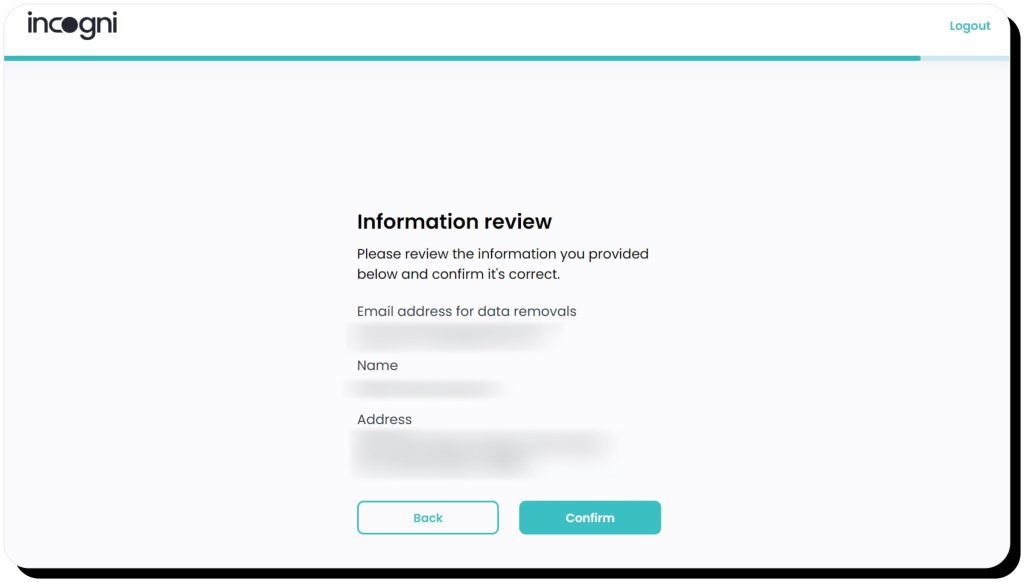
6. Provide additional information
If prompted, you’ll need to add your phone number and date of birth to help Incogni identify which records are yours in public databases.
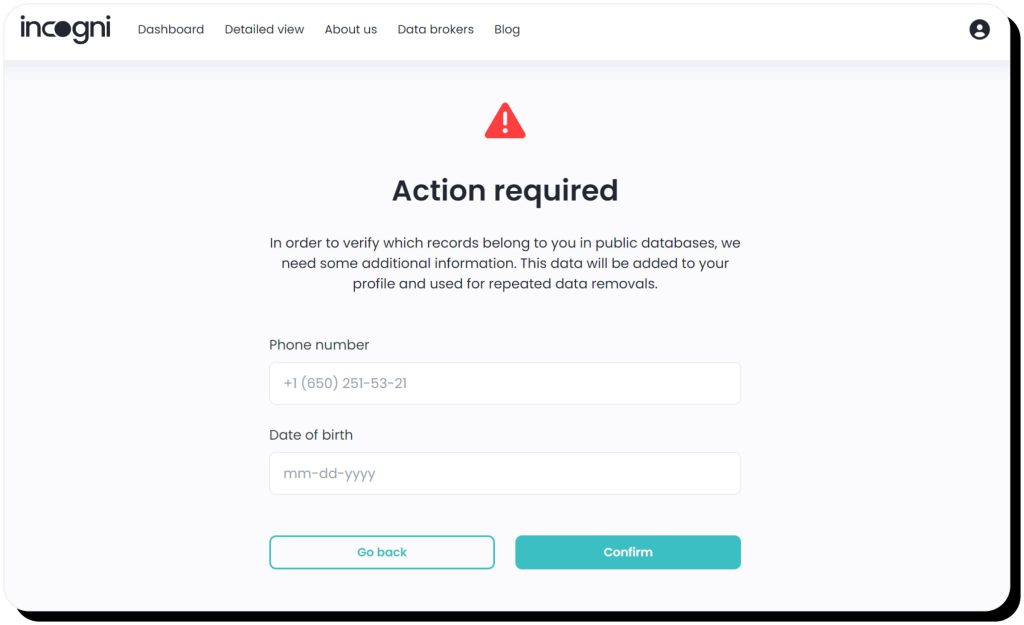
7. Select matching profiles
If Incogni finds multiple matching records during the registration process, they’ll ask you to verify which records are yours.
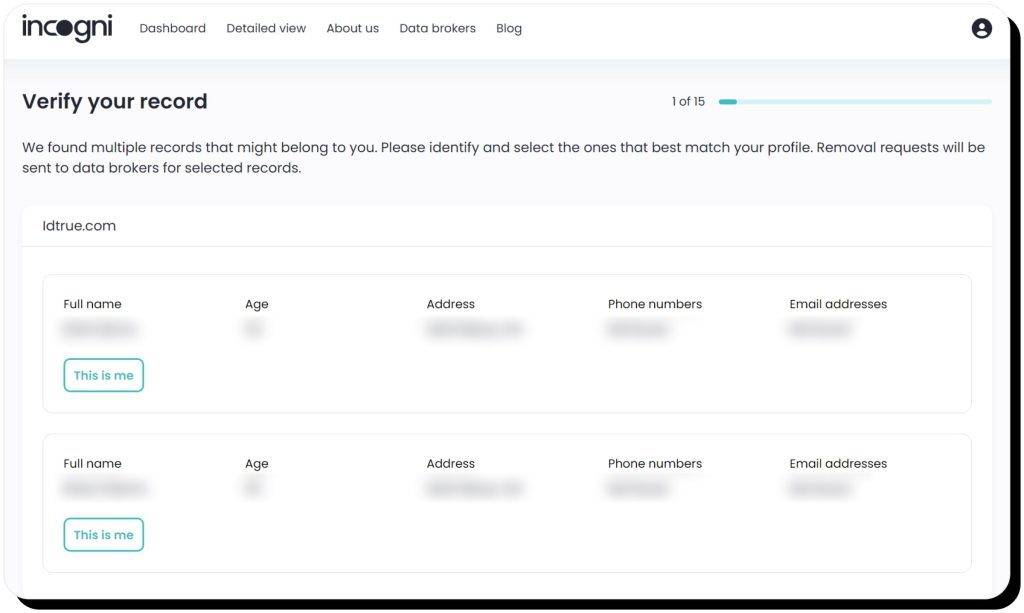
8. Submit data broker opt-out requests
Once you’re signed up, Incogni automatically sends official data removal requests to its list of data brokers. You can log in to your Incogni dashboard to check progress, and Incogni will email a data removal progress report each week.
Automated data removal
Incogni automates personal data removal from its list of around 200 sites (and they routinely add new data brokers). Most of the sites Incogni covers are marketing data brokers along with a few that focus on recruitment and risk mitigation. These companies sell customer data to other businesses, and many are private data brokers whose online databases aren’t available to the public.
Incogni also removes your data from some people-search sites, which are the most problematic type of data brokers because they sell personal information to anyone willing to pay. However, we cross-referenced Incogni’s data broker list with Onerep’s list and found that Incogni misses popular people-search sites such as Whitepages, Truthfinder, Spokeo, Intelius, and BeenVerified. These are listed on the California Data Broker Registry, so excluding them means your information is still available on some of the most well-known companies.
| People-search sites | California Data Broker Registry | Onerep | Incogni |
|---|---|---|---|
| Whitepages | Yes | Yes | No |
| Spokeo | Yes | Yes | No |
| BeenVerified | Yes | Yes | No |
| Intelius | Yes | Yes | No |
| Truthfinder | Yes | Yes | No |
How Incogni removes your data
Incogni doesn’t scan the various data brokers on its list to find your profiles. Instead, it uses an algorithm to predict which sites are likely to have your information. Then, Incogni contacts each data broker via an automated process that sends data removal requests (which includes providing your contact information to the broker).
In some cases, data brokers will contact you directly, either to verify your request or to make you take extra steps to secure removal. You don’t need to do anything if Incogni is copied on the email. If Incogni isn’t copied, they recommend replying (and copying them) with a message telling the broker to direct all communications to Incogni. If the email comes from a third-party compliance service with a “no-reply” address and a “confirm email” button, you can simply click the button to verify your request.
Some data brokers might also send you direct emails confirming they’ve removed your information.

The opt-out process can take anywhere from a few days to a few weeks, depending on each individual data broker.
How Incogni tracks removal request progress
Incogni tracks the data removal process so you know how many data brokers have removed your information at any given time. However, just as it doesn’t scan to find your profiles, it also doesn’t scan each site to verify your information was removed. Instead, it relies on each data broker to respond to its request, which means the Incogni data removal tool doesn’t confirm whether the request was honored. In fact, Incogni states it cannot guarantee removal.
That said, data protection laws such as the California Consumer Privacy Act require data brokers to comply with data removal requests. There can be hefty fines for noncompliance, so generally speaking, we would expect companies to remove your data – but again, there are no guarantees without checking yourself.
Note that Incogni does randomly check people-search sites that publicly display personal information (they’ll ask you to verify your profile if they find multiple potential matches on those sites). If a site fails to comply with a removal request, Incogni will file a complaint on your behalf.
Monitoring and reporting
You can log into your Incogni account to view the main dashboard, which displays the number of data deletion requests sent, in progress, and completed alongside an interactive chart. The Incogni dashboard allows you to toggle between monthly stats and the total number of opt-out requests since you signed up.
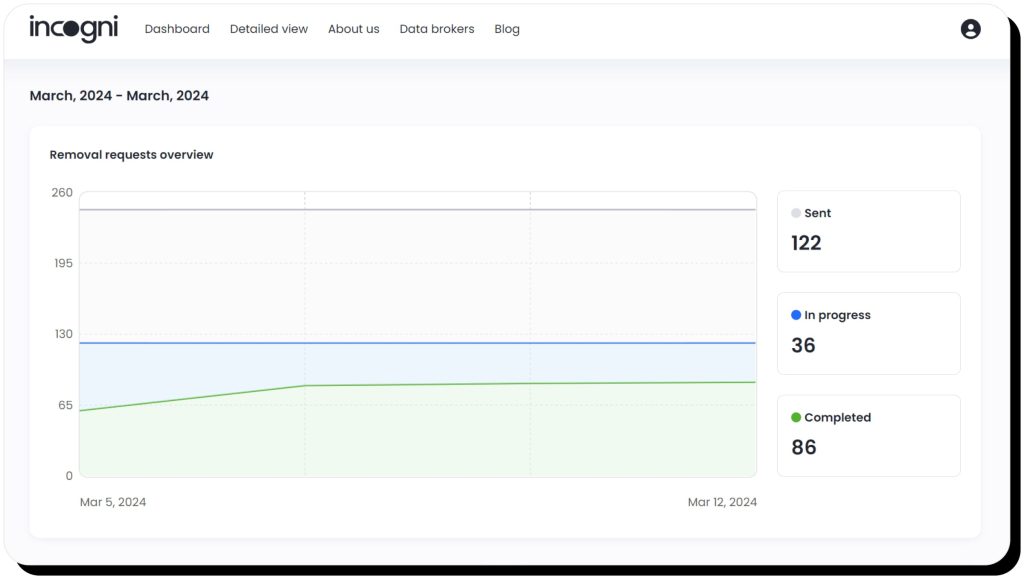
Below the chart, Incogni shows how much time they’ve saved you, the number of suppression list entries they’ve attained, and an activity log summary. A suppression list entry means a data broker will no longer collect and share your information. You can follow the link to see the full activity log.

The dashboard’s detailed view lists the complete number of data brokers Incogni has contacted and allows you to track the removal process. It features a sortable table with key details such as:
- Compliance score: How quickly sites typically comply with official removal requests
- Severity score: The estimated risk level posted by each data broker (low, medium, or high)
- Requests sent: The number of requests Incogni has sent
- Request status: In progress, suppressed, or completed
You can toggle between a list of private databases and public databases Incogni uses to get data removed.
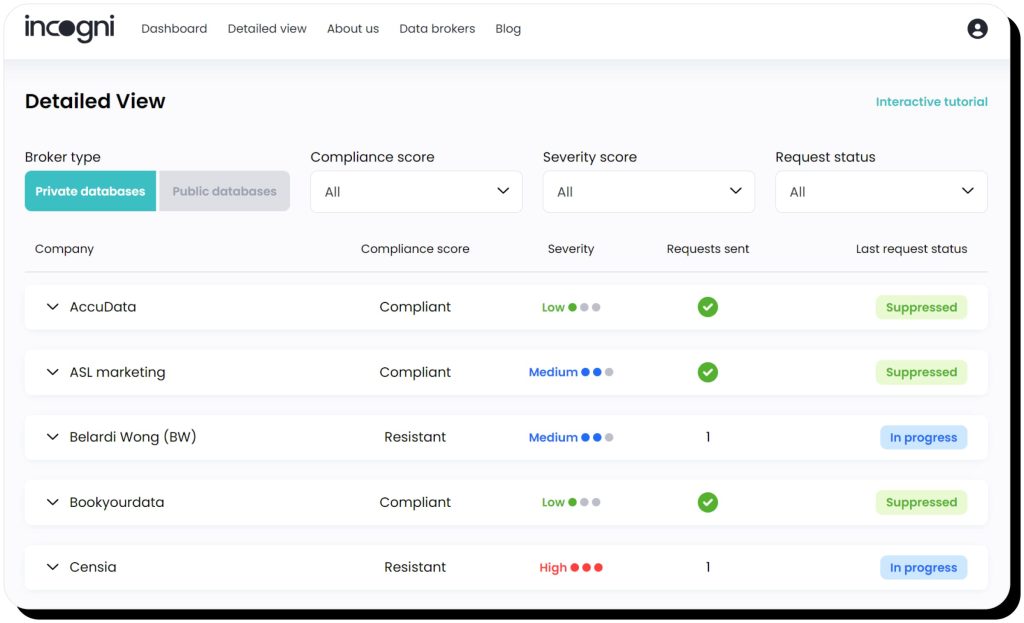
The detailed view also allows you to click on each data broker for detailed reports that include:
- Request status
- Last request sent date
- Last request completed date
- Average resolution time
- Upcoming requests (if applicable)
- About the data brokers
- Associated risks
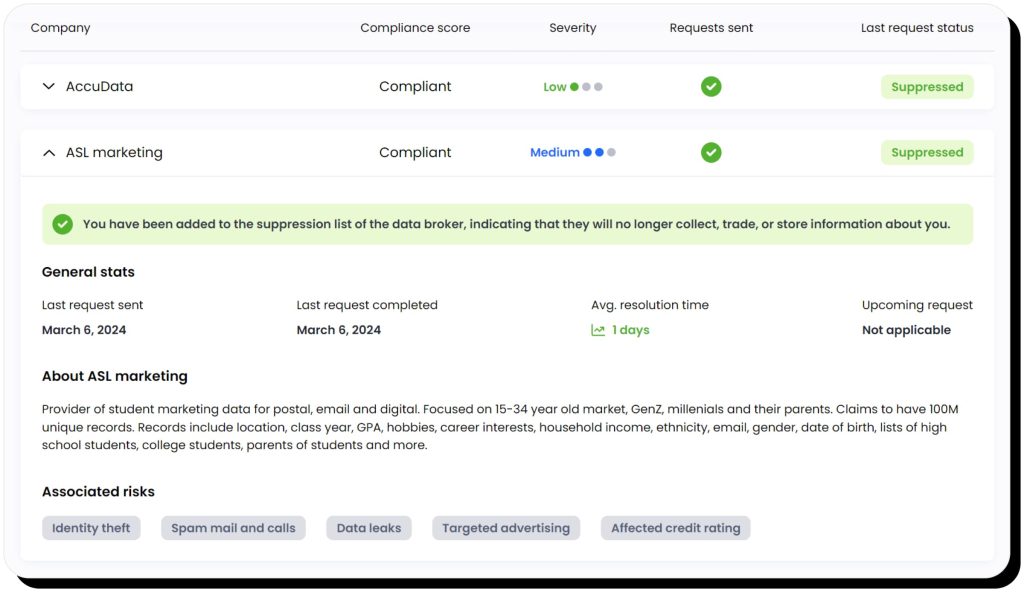
Incogni also emails weekly progress reports that show the number of requests sent, in progress, and completed.
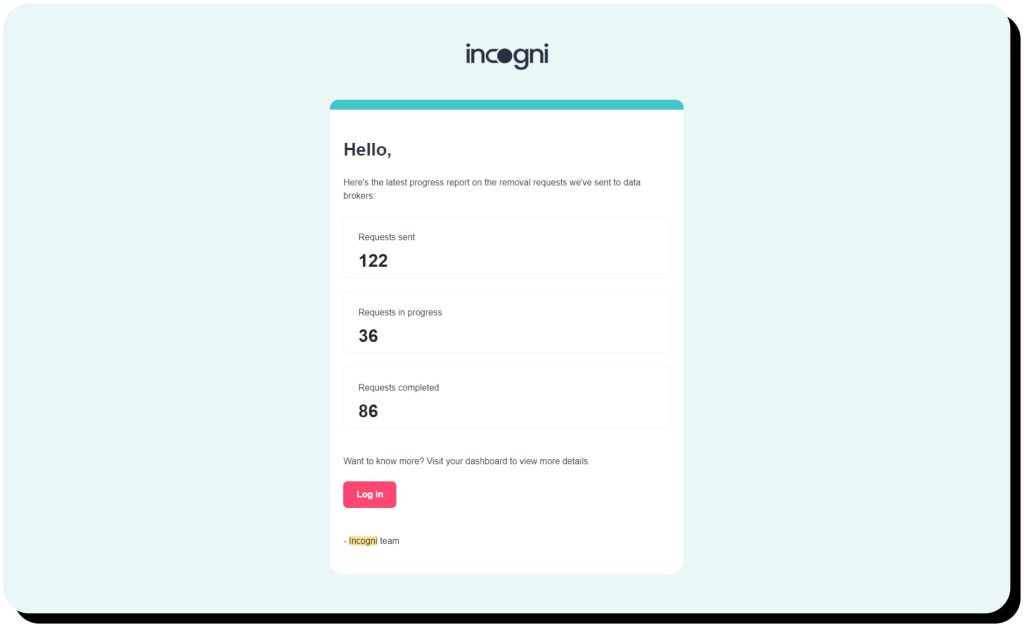
Though Incogni makes it easy to see all the details about the sites they’re sending data removal requests to, it’s worth noting that they don’t actually know if your information was on any of those sites in the first place. Their algorithm simply tries to predict which data brokers have your info, which can lead to false positives and cause Incogni to share your information with brokers who didn’t previously have it.
Moreover, Incogni relies on data brokers to self-report removal rather than verifying it themselves (though they do randomly check some people-search sites). There are no links to see exactly where they found your profiles, what information was listed about you, or to confirm removal.
After the initial removal, Incogni regularly resends requests to try to keep your information from reappearing on data broker sites.
Support and security
Incogni provides customer service via a searchable knowledge base and a contact form. Some of the knowledge base entries also include a support email address. Incogni doesn’t appear to offer phone or chat support.
The company also offers two-factor authentication that works with an authenticator app such as Aegis, Raivo OTP, Authy, or Google Authenticator to secure your account. You can enable 2FA on your profile page.
Incogni limits its data collection only to the information needed to submit data removal requests. Incogni retains user data required to provide the service for up to 12 months after service termination and data required for customer service for up to two years. They do not sell information to third-party companies.
Most data broker companies require your email address, and some require your phone number to verify your identity before they process removal requests. Incogni may share your email and phone number with data brokers to provide their service, and since they guess which sites have your information, that means they can share your info with sites that didn’t previously have it – and some sites could use it to create profiles on you rather than honor removal requests.
What is the cost of Incogni?
An Individual Incogni subscription costs $14.98 for a monthly plan or $89.88 for an annual plan, which comes to $7.49 per month. They also offer a Family & Friends plan for up to 5 people which costs $32.98 for a monthly plan or $197.88 for an annual one. They don’t have business plans at the moment of writing.
Notably, Incogni offers a 30-day money-back guarantee.

Is Incogni the right choice for your online privacy needs?
Our Incogni review reveals that Incogni is a good choice if you’re primarily concerned about removing yourself from marketing and risk mitigation databases. However, other services have better coverage for people-search sites.
In addition, when sending opt-out requests, Incogni shares your phone number and email address with data brokers, which can lead to false positives and cause the service to send your contact information to companies that didn’t have it in the first place.
Though Incogni does randomly check some people-search sites, its help documentation states that it considers a request completed when a data broker confirms removal. In other words, Incogni doesn’t scan each site to verify removal on its own.
If you’re looking for data removal services that focus on people-search sites, independently confirm removal, cover more sites in total, and safeguard your contact information, you might want to consider similar services such as Onerep.
FAQ
How to cancel your Incogni subscription?
You can cancel Incogni by emailing their customer service team at [email protected] or by submitting a request on their website. You might need to contact Incogni’s payment processor, Paddle, to submit your cancellation request.
Does Incogni reduce spam calls?
Incogni removes your information from databases companies use to market their products and services, including telemarketers. That means signing up for Incogni should reduce the number of spam calls you receive.
Is Incogni safe?
Incogni is a legitimate service that doesn’t sell your information to third parties. However, Incogni does share your email address and phone number with data brokers to verify your identity, which could expose your information to companies that didn’t have it before.
Is Incogni a VPN?
No, Incogni is not a VPN, it is a data removal service. However, it is owned by Surfshark, which is a VPN provider.


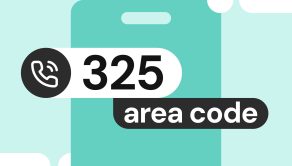


Mikalai is a Chief Technical Officer at Onerep. With a degree in Computer Science, he headed the developer team that automated the previously manual process of removing personal information from data brokers, making Onerep the industry’s first fully automated tool to bulk-remove unauthorized profiles from the internet.